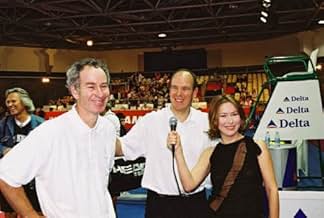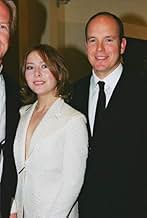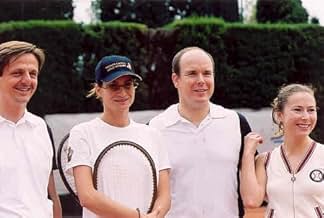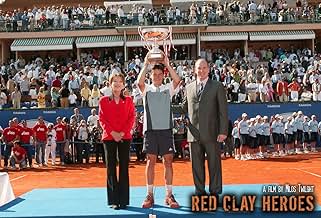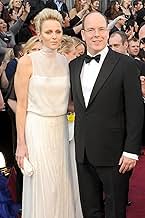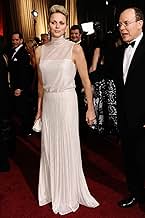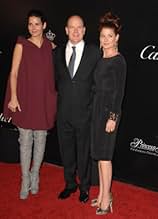Prince Albert of Monaco
- Actor
- Producer
- Additional Crew
Albert grew up in extremely sheltered and wealthy circumstances in the Princely Palace of the Grimaldis in Monaco, where he received private school lessons. He graduated from high school in 1976 at a Swiss boarding school. The Crown Prince then moved to the USA in 1977, where he studied political science at various elite universities before completing his education with a master's degree at Amherst College in Massachusetts in 1981. From 1981, Albert did his military service in the French Navy, which he left with the rank of officer. In 1982 his mother, Princess Gracia Patricia (Grace Kelly), died in a tragic accident. The following year, 1983, he spent a year at the New York commercial bank Morgan Guaranty Trust Company and from 1984 he worked for the champagne manufacturer Moet & Chandon. In 1985, the Crown Prince returned to Monaco to prepare for taking over his father's duties.
However, he was often in the public eye as an athlete, especially as a passionate bobsledder. Albert represented the Principality of Monaco at the Winter Olympics five times (1988 to 2002). His best placement was 25th place in 1988 in the two-man bobsleigh with Gilbert Bessi. He had been a member of the International Olympic Committee since 1985. In 1994 he became chairman of the National Olympic Committee of Monaco. He also became active as president of organizations such as the Red Cross of Monaco, the International Television Festival and the athletics and bobsleigh associations. Repeated speculations in the following years about the prince taking office early were denied by him for a long time. Nevertheless, he increasingly took on representative tasks for the royal family, which also included state visits to other European countries.
On March 31, 2005, the terminally ill Prince Rainier III. the official protocol duties passed on to his son. Rainier III died shortly afterwards on April 6, 2005 in Monaco. The official enthronement of Albert II as the 30th Prince of Monaco took place after the almost three-month mourning period that began with the burial of Rainer III. on April 15, 2005. At the beginning of July 2005, Albert announced that he was the father of his illegitimate son Alexandre from his relationship with Nicole Coste, a stewardess from Togo. The recognition of paternity brought with it civil inheritance claims for the child, but no claim to the succession to the throne. Only a little later it became known that he was also the father of a girl born in 1992. Prince Albert officially recognized paternity in June 2006.
In April 2006, Albert II took part in a North Pole expedition launched to mark the 100th anniversary of the Arctic expedition of his great-great-grandfather, Prince Albert I. Albert II used the international media interest that his participation in the expedition generated to draw attention to the dangers posed to the Arctic region by global warming. On Easter Sunday, April 16, Albert II became the first sitting head of government to set foot at the North Pole. For his efforts, he was awarded the Champions of Earth Award in 2008. At the beginning of 2009 he also reached the South Pole. With Monaco's admission to the Council of Europe (2004) and the introduction of the euro in the country (2002), the pressure grew to cooperate more closely with the Europeans, to make financial flows more transparent and to prosecute crimes. As regent of the 32,000-strong principality (2011), Albert II faced increasing pressure from the European Community, particularly Germany and France, to open Monaco to the outside world.
Accordingly, in 2007, Monaco was still on the OECD list of states that are among the "uncooperative" tax havens in the world, along with Liechtenstein and Andorra. Monaco had still not concluded any agreements with another country on the mutual exchange of tax information. The country also appeared closed when other states asked for administrative and legal assistance. In order to preserve Monaco's sovereignty in the European community, he announced that the country would be given a new financial directive, away from black money and money laundering. The country then cooperated with the states of the European Union within the framework of the EU Savings Directive and levied a withholding tax on interest income from foreigners. Monaco concluded an agreement with France, according to which French people were taxed in Monaco in the same way as in France.
At the same time, Albert II and his Minister of State Michel Roger tried to strengthen the attractiveness of the Monaco financial center. Fund managers and investment bankers in particular should be attracted with low tax rates. The banking sector thus became one of the country's most important sources of income. Almost a third of Monaco's residents earn more than E1 million euro; The country's banks are expected to manage around 90 billion euros (2011). On June 23, 2010, Albert II became engaged to the South African swimmer Charlene Wittstock. The wedding took place on July 2nd and 3rd, 2011.
However, he was often in the public eye as an athlete, especially as a passionate bobsledder. Albert represented the Principality of Monaco at the Winter Olympics five times (1988 to 2002). His best placement was 25th place in 1988 in the two-man bobsleigh with Gilbert Bessi. He had been a member of the International Olympic Committee since 1985. In 1994 he became chairman of the National Olympic Committee of Monaco. He also became active as president of organizations such as the Red Cross of Monaco, the International Television Festival and the athletics and bobsleigh associations. Repeated speculations in the following years about the prince taking office early were denied by him for a long time. Nevertheless, he increasingly took on representative tasks for the royal family, which also included state visits to other European countries.
On March 31, 2005, the terminally ill Prince Rainier III. the official protocol duties passed on to his son. Rainier III died shortly afterwards on April 6, 2005 in Monaco. The official enthronement of Albert II as the 30th Prince of Monaco took place after the almost three-month mourning period that began with the burial of Rainer III. on April 15, 2005. At the beginning of July 2005, Albert announced that he was the father of his illegitimate son Alexandre from his relationship with Nicole Coste, a stewardess from Togo. The recognition of paternity brought with it civil inheritance claims for the child, but no claim to the succession to the throne. Only a little later it became known that he was also the father of a girl born in 1992. Prince Albert officially recognized paternity in June 2006.
In April 2006, Albert II took part in a North Pole expedition launched to mark the 100th anniversary of the Arctic expedition of his great-great-grandfather, Prince Albert I. Albert II used the international media interest that his participation in the expedition generated to draw attention to the dangers posed to the Arctic region by global warming. On Easter Sunday, April 16, Albert II became the first sitting head of government to set foot at the North Pole. For his efforts, he was awarded the Champions of Earth Award in 2008. At the beginning of 2009 he also reached the South Pole. With Monaco's admission to the Council of Europe (2004) and the introduction of the euro in the country (2002), the pressure grew to cooperate more closely with the Europeans, to make financial flows more transparent and to prosecute crimes. As regent of the 32,000-strong principality (2011), Albert II faced increasing pressure from the European Community, particularly Germany and France, to open Monaco to the outside world.
Accordingly, in 2007, Monaco was still on the OECD list of states that are among the "uncooperative" tax havens in the world, along with Liechtenstein and Andorra. Monaco had still not concluded any agreements with another country on the mutual exchange of tax information. The country also appeared closed when other states asked for administrative and legal assistance. In order to preserve Monaco's sovereignty in the European community, he announced that the country would be given a new financial directive, away from black money and money laundering. The country then cooperated with the states of the European Union within the framework of the EU Savings Directive and levied a withholding tax on interest income from foreigners. Monaco concluded an agreement with France, according to which French people were taxed in Monaco in the same way as in France.
At the same time, Albert II and his Minister of State Michel Roger tried to strengthen the attractiveness of the Monaco financial center. Fund managers and investment bankers in particular should be attracted with low tax rates. The banking sector thus became one of the country's most important sources of income. Almost a third of Monaco's residents earn more than E1 million euro; The country's banks are expected to manage around 90 billion euros (2011). On June 23, 2010, Albert II became engaged to the South African swimmer Charlene Wittstock. The wedding took place on July 2nd and 3rd, 2011.


